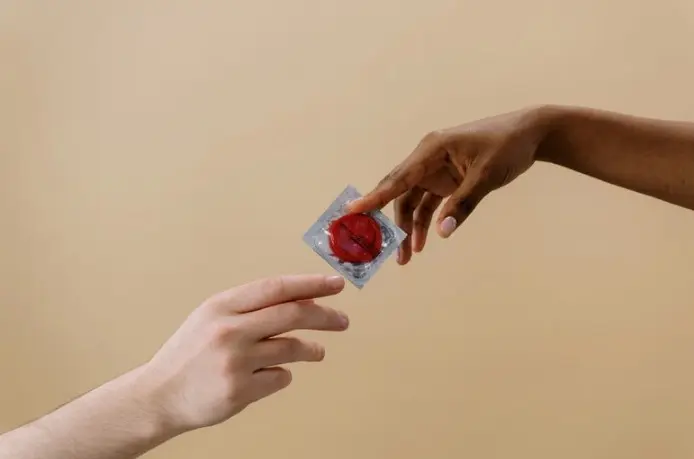Sexual activity is an important part of later life, often associated with better cardiovascular health, greater self-esteem and improved mental wellbeing.
While sexual activity can decrease with age, a large number of older adults still thoroughly enjoy it.
Unfortunately, sexuality in later life can be subject to stigma, misconceptions and a reduced emphasis on safer sex. This can lead to an increase in sexually transmitted infections (STIs) among this age group.
Do people over 60 get STIs?
Yes!
It is a common misconception that people over 60 rarely contract STIs. It is actually reported that STIs amongst this age group are on the rise. STIs don’t just affect the young!
Many older adults who have recently re-entered the dating scene are unaware of which STIs are out there, how they are contracted and how to spot them.
Sex education is much improved on the levels many older adults received at school. As such, people over 60 are often unaware of the range of STIs and their risks. This can lead to a reluctance to use protection like condoms, especially when there is no risk of unplanned pregnancy.
So, in this blog, we will give you some advice on STIs – how to spot them, how they are treated and how to prevent them.
What are sexually transmitted infections (STIs)?
STIs are an infection that can be passed on between sexual partners during unprotected sexual contact. Unfortunately, they are very common and can affect anyone of any age or background.
There are more than 25 STIs which are spread by vaginal, anal or oral sex.
What are the types of STI?
If you have a new partner and are concerned about the risk of contracting an STI, these are the most common types to be aware of:
- Chlamydia: Chlamydia is a bacterial infection and one of the most common STIs in the UK
- Gonorrhoea: Gonorrhoea is a bacterial infection which can infect the urethra, womb, rectum and be passed through the throat or eyes
- Hepatitis B: Hepatitis B is a virus which is spread through bodily fluids and can cause infection to the liver
- Herpes: Herpes causes blisters around the genitals which can clear up, but often return
- Mycoplasma Genitalium (Mgen): Mgen is a type of bacteria which can cause an STI
- Shigella: Shigella is a bacterial infection which causes diarrhoea, stomach pain and fever. It is carried in faeces and can be passed on during anal sex
- Syphilis: Syphilis is a bacterial infection which is typically caught through unprotected sex
- Trichomoniasis: Trichomoniasis is caused by a parasite which commonly gets transmitted during sex. Half of all cases never develop symptoms, but can still be passed on
- Warts: Genital warts are small growths around the genitals or anal area
If you would like more in-depth information on each of the mentioned STIs, click here: https://essexsexualhealthservice.org.uk/sti-hiv/
What are the symptoms?
When it comes to symptoms, many people won’t initially show any signs of having an STI. So, it’s important that you test regularly, particularly if you have unprotected sex with a new sexual partner.
Sometimes symptoms won’t appear for a number of weeks or months and then may even reduce. However, the infection can still be present and, if left untreated, could lead to pain, discomfort and even damage to your health and fertility.
But, the most important factor is that, even if you are unaffected and symptomless, you can pass on the infection to your sexual partner who could be much more seriously affected by it.
The most common symptoms and signs of having an STI are:
- Unusual discharge from the vagina or penis
- Pain when passing urine
- Itches, rashes, lumps or blisters around the genital or anus areas.
- Bleeding after sex
- Pain in testicles
- Pain in lower abdomen
How do you get tested for STIs?
If you suspect that you have an STI, you can order one of our free self-testing kits at https://essexsexualhealthservice.org.uk/self-test/
Our self-testing kits make it quick and easy to find out if you have an STI at home, without needing to visit a clinic.
A kit will be discreetly sent to your chosen address and, once you’ve returned your sample, you will receive your confidential results within a few days.
Alternatively, you can get tested for STIs at any sexual health clinic or visit your GP, contraception clinic or many pharmacies.
What are the treatments for STIs?
There is currently effective treatment for most STIs.
Bacterial (e.g. chlamydia, gonorrhoea and syphilis) and parasitic STIs (e.g., trichomoniasis) are normally curable with a single or multiple doses of antibiotics.
For viral STIs (e.g. HIV), the most effective medications are antivirals. These cannot cure the STIs but can reduce the harm caused by the infections, easing the symptoms and improving your quality of life.
If you test positive via one of our self-testing kits, we will contact you to discuss and arrange treatment.
How can you prevent catching or spreading STIs?
A lack of education about STIs among the older generation can lead to misconceptions.
STIs are not only contracted through traditional penetrative sexual contact but can also be transmitted orally, anally and through other skin-to-skin contact. They can also be passed via sharing sex toys without cleaning them in-between uses.
There is only one method currently available which can protect you and your partner against STIs – the condom. Condoms work by capturing sperm and avoiding direct contact between your genitals and your partners.
To be fully safe from the possibilities of contracting an STI from a new sexual partner, a condom should be used.
Particularly with a new partner, a condom is the safest way to protect you both. A free STI self-testing kit (and regular testing) can then help put your minds at rest if you choose to have unprotected sex.
Our clinics and support for you:
Essex Sexual Health Service is delivered by a range of clinics across the county. We are here to help you.
Our clinics and clinicians are confidential and discreet, with the aim of helping you maintain good sexual health.
We have everything you need to keep yourself and your sexual partners protected, all you need to do is ask and our friendly team will help however we can.
Don’t worry! Most STIs can be easily treated. Contact us on 0300 003 1212 and we’ll help arrange the treatment you need.
Or, for more ways to get in touch and find your nearest clinic visit: https://essexsexualhealthservice.org.uk/contact/



